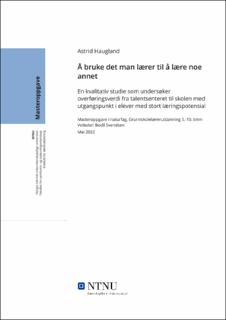| dc.contributor.advisor | Svendsen, Bodil | |
| dc.contributor.author | Haugland, Astrid | |
| dc.date.accessioned | 2022-09-22T17:20:33Z | |
| dc.date.available | 2022-09-22T17:20:33Z | |
| dc.date.issued | 2022 | |
| dc.identifier | no.ntnu:inspera:112394240:30265880 | |
| dc.identifier.uri | https://hdl.handle.net/11250/3020781 | |
| dc.description.abstract | Følgende studie har til hensikt å undersøke overføringsverdien mellom talentsenteret og skolen. Oppgaven tar utgangspunkt i eksisterende og relevant litteratur om elever med stort læringspotensial, samt Vygotskys (1978) syn på læring i samhandling med andre og hans teori om elevens proksimale utviklingssone. Studiens forskningsspørsmål besvares basert på innhentet datagrunnlag, som inkluderer fire semistrukturerte elevintervju. Analysetilnærmingen er inspirert av konstant komparativ metode, og omfatter koding, og om mulig objektiv vurdering av elevenes beskrivelser og utsagn. For å kunne tolke elevsvarene om talentsenterets tilnærming til læring, presenteres litteratur om utforskende og praktisk arbeid. Teori og analyse blir diskutert opp mot hverandre i diskusjonskapittelet, og tar utgangspunkt i analysens tre hovedkategorier: (i) lærelyst, (ii) samarbeid, (iii) utforskende tenkemåte.
Ifølge overordnet del i læreplanverket skal skolen ta vare på alle elevers identitet og selvbilde (Kunnskapsdepartementet, 2017). Skolen skal bidra til å utfolde elevenes skaperglede og utforskertrang, og lære dem om samarbeid for å fungere sammen med andre for å øke utvikling og læring. Funnene i studien tilsier at elevenes lærelyst øker på talentsenteret på grunn av tilhørighetsfølelse, tilpasset undervisning og fellesskap. Studien viser at på talentsenteret gir elevene øvelse i å anvende kunnskapen, og erfaringsbanken i å håndtere fagrelaterte utfordringer blir større. Gjennom møte med aktuelle fagfolk på talentsenteret får elevene et annet læringsperspektiv enn hva de får på skolen.
Samtidig som elevene uttrykker stor lærelyst, blir de også minnet på at det er mye de ikke kan. Elevene forstår at kunnskap er en dynamisk prosess, hvor de opparbeider seg læringsstrategier i møte med både oppgaver og medelever som gir motstand. Ved å være på talentsenteret får elevene øvelse i å kommunisere ideer og lytte til hverandre slik at de erfarer samarbeid som en nyttig og viktig kompetanse. Elevene gir uttrykk for at utforskende og praktisk arbeid har betydning for å se sammenheng mellom teori og praksis, deres målorientering, ferdigheter i problemløsning, og kompetanse i å anvende kunnskap. Av slike resultat kan man argumentere med at talentsenteret er en viktig arena for at elever med stort læringspotensial kan utvikle de ferdighetene læreplanverket ønsker. Gjennom å tilby utfordringer tilpasset deres nivå utvides deres proksimale utviklingssone, noe som tidligere forskning viser til at bidrar til økt læring. Deltakelsen på talentsenteret gir elevene en ryggsekk med erfaring og ferdigheter de kan dra fordel av i arbeid med oppgaver på skolen. | |
| dc.description.abstract | This thesis's main research objective is to investigate aspects applied at the "Talentsenter" that are transferable to the Norwegian school. Existing literature on gifted students, as well as Vygotskys (1978) concerning the view of learning in interaction with others, and his theory on student's zone of proximal development, creates the foundation for answering the thesis's research questions. The research questions are also answered based on the obtained database which includes four semi-structural interviews with students attending the Talentsenter. The analysis approach is inspired by the constant comparative method, which includes coding and objective assessment of the students' descriptions and statements. In order to interpret the answers of the students regarding the teaching methods at the Talentsenter, literature regarding exploratory and practical work is presented. Theory and the analyses are discussed and compared in the discussion chapter in the view of three main categories: (i) desire to learn, (ii) collaboration, (iii) an inquiry way of thinking.
According to the Core curriculum – values and principles for primary and secondary education, the Norwegian school shall take care of the identity and self-image of all students (Kunnskapsdepartementet, 2017). The school should contribute to helping students to unfold their joy of creativity and desire to explore, and further teach them about how to collaborate with others to increase development and learning. The findings in the study imply that the desire to learn increases at the Talentsenter due to a sense of belonging, adapted education, and fellowship. The study shows that the Talentsenter gives the students experience in applying the knowledge they have gained, consequently increasing their bank of experience in dealing with subject-related challenges. Through meetings with relevant professionals at the Talentsenter, the students also obtain a different learning perspective than what they receive at the school.
Together with expressing a great desire to learn, the students at the Talentsenter are also reminded that there is a lot that they don't have learned yet. The students understand that gaining knowledge is a dynamic process and that they develop learning strategies in solving tasks and dealing with fellow students who give resistance. By attending the Talentsenter the students obtain practice in communicating ideas and listening to each other, consequently experiencing that collaboration is a useful and important skill. The students express that inquiry and practical work are important for understanding the relationship between theory and practice, their goal orientation, problem-solving skills, and ability to apply knowledge. From these results, it can be argued that the Talentsenter is an important arena for gifted students to develop the skills that are referred to in the Norwegian curriculum. By offering challenges that are tailored to their level of knowledge, their zone of proximal development expands. Previous research on the subject implies that this contributes to increased learning. The participation at the Talentsenter gives the students experiences and skills that they can use in assignments at their school. | |
| dc.language | nob | |
| dc.publisher | NTNU | |
| dc.title | Å bruke det man lærer til å lære noe annet. En kvalitativ studie som undersøker overføringsverdi fra talentsenteret til skolen med utgangspunkt i elever med stort læringspotensial | |
| dc.type | Master thesis | |
